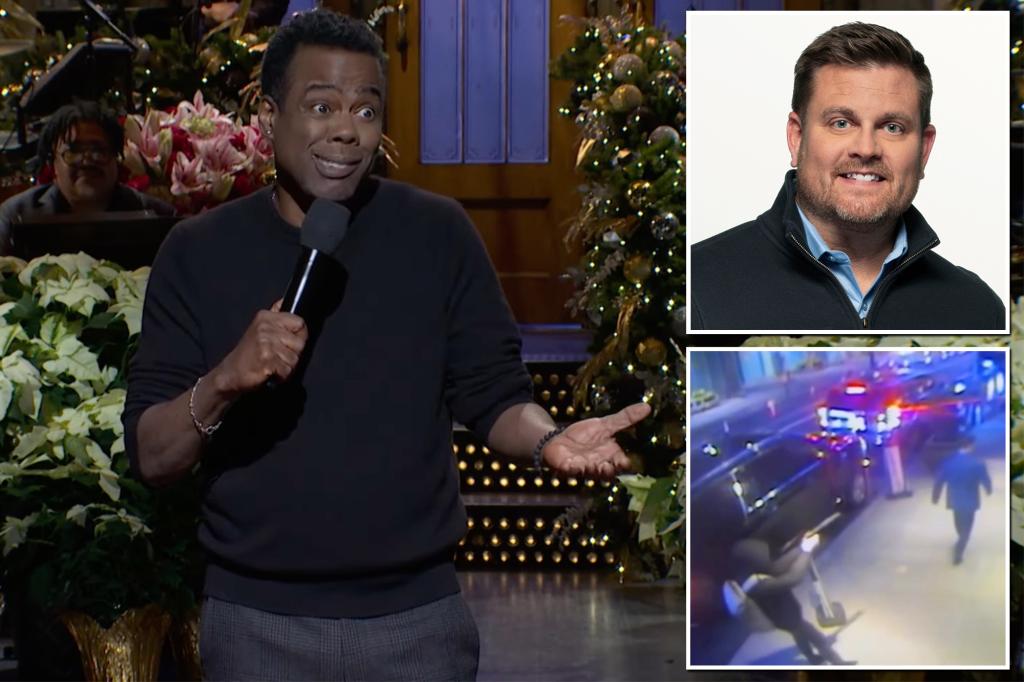Chris Rock’s “Saturday Night Live” monologue sparked controversy with his jokes about the assassination of UnitedHealthcare CEO Brian Thompson. Rock’s humor, known for its edgy and provocative nature, seemed to cross a line for many viewers as he juxtaposed Thompson’s murder with the violence often depicted in shows like “The Wire.” While acknowledging the tragedy and offering condolences to the family, Rock quickly pivoted to commentary on societal reactions to crime, suggesting that public sympathy might be influenced by the perpetrator’s physical appearance. He implied that had the accused shooter, Luigi Mangione, not been considered attractive, the public outcry and media attention might have been less significant. This line of reasoning drew immediate criticism, with many viewers expressing discomfort over what they perceived as a trivialization of a serious crime and the insensitivity towards the victim’s family.
The backlash against Rock’s monologue manifested across social media platforms, with users condemning his remarks as “disgusting” and “pathetic.” The specific comparison of Thompson to a drug dealer further fueled the outrage, as many pointed out the factual inaccuracy and the perceived disrespect towards those working in the healthcare industry. The criticism centered not only on the content of the jokes but also on the perceived inappropriateness of using a tragic event as comedic fodder, particularly so soon after the incident. The controversy highlighted the delicate balance comedians face when tackling sensitive topics, with some viewers arguing that Rock’s humor crossed the boundary of good taste.
Beyond Rock’s monologue, the episode continued to address the assassination, albeit through a different lens. A sketch featuring cast member Sarah Sherman impersonating legal commentator Nancy Grace satirized the public’s fascination with Mangione’s appearance. Sherman, as Grace, lampooned the media’s portrayal of the accused shooter as a “sex icon,” highlighting the absurdity of such a label in the context of a murder investigation. The sketch served as a commentary on the often-superficial nature of media coverage, which can sometimes prioritize sensationalism over the gravity of the crime itself.
The “SNL” sketch also touched upon the broader societal context surrounding the murder, incorporating themes of economic disparity and healthcare affordability. Kenan Thompson’s portrayal of an unemployed man named Donnell Davis underscored the struggles faced by many Americans in accessing affordable healthcare. His character’s quip about needing a “manifesto” to impress someone instead of a poem, referencing Mangione’s own written pronouncements, injected a layer of dark humor into the sketch while subtly alluding to the potential motivations behind the crime. This inclusion of socio-economic commentary broadened the scope of the sketch beyond the immediate details of the case, prompting reflection on the systemic issues that may have contributed to Mangione’s alleged actions.
The details surrounding the assassination itself revealed a chilling narrative. Luigi Mangione, a University of Pennsylvania graduate, allegedly shot and killed Brian Thompson as the CEO walked to a Hilton hotel. Following the shooting, Mangione embarked on a five-day manhunt that ended with his apprehension at a Pennsylvania McDonald’s, thanks to an alert employee. The recovery of a 3D-printed pistol with a homemade silencer, a loaded Glock magazine, and multiple fake IDs from Mangione’s possession further intensified the seriousness of the situation. The discovery of a handwritten manifesto addressed to “the Feds,” railing against corporate greed within the health insurance industry, provided potential insight into Mangione’s motivations, suggesting a possible connection between his alleged actions and his grievances against the healthcare system.
The legal proceedings in the case rapidly progressed, with ballistics matching the ghost gun to shell casings found at the crime scene and Mangione’s fingerprints identified on items near the location. He secured the representation of Karen Friedman-Agnifilo, a seasoned former Manhattan prosecutor, to navigate the complex legal landscape ahead. Manhattan District Attorney Alvin Bragg’s announcement of Mangione’s potential extradition to New York City to face murder charges solidified the seriousness of the allegations and set the stage for what promised to be a closely watched legal battle. The multifaceted nature of the case, involving elements of personal grievance, healthcare industry critique, and public fascination with the accused, ensured that it would continue to be a subject of intense scrutiny and debate.

